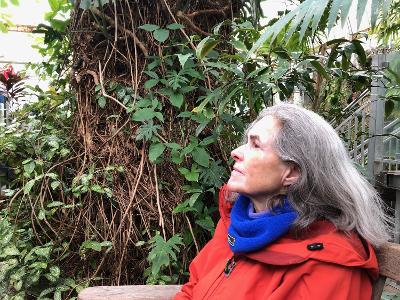Cynthia Read Gardner
Good morning, everyone. Under normal circumstances, I would be saying, “Happy Fourth of July Weekend” and we’d be packing the picnic lunches and getting the sparklers and flags ready. But these are far from normal circumstances, as we well know. We’re social distancing, wearing our masks and trying to stay healthy and well, for others’ sakes as well as our own.
Many of us have been out protesting racial inequity, which is another form of trying to help our whole world become well – or at least, better than it has been, which may be the best we can hope for at this moment in time.
This column has always been devoted to diversity, which means we feature poets of all racial, cultural, gender and age groups. You’ll have to decide for yourselves in which category Gardner belongs. How about “human”?
In seeking the right words for Cynthia Read Gardner’s poems, I found myself calling her a poet of “deep simplicity.” This may have something to do with her deep New England roots, which go back to early Connecticut and Rhode Island, as well as to Massachusetts, her current home. I’ve watched her poetry grow over the years, strengthened, I believe, by the body-and-brain workouts she has long given herself in competitive swimming, running, cross-country skiing and triathlons. Amazingly – or perhaps “inspiringly,” if such a word exists, she qualified for the New York Marathon and the Boston Marathon in her sixties.
Widowed after a longtime marriage, she has two grown sons and still maintains the home they grew up in so that they have somewhere to stay when they visit, as so many of us in her demographic do, if we can.
Professionally, Cynthia Read Gardner is a full-time social worker. She has a private practice and has worked as a Clinical Juvenile Court Clinician in Pittsfield, MA for the past 23 years.
Her poetry is far from a sideline, however. She works at it seriously and published her first collection, a chapbook, How Will They Find Me? in 2012. Her poems have appeared in such journals as Alaska Quarterly Review, Southern Poetry Review, The Bridge, and in a number of anthologies, such as Crossing Paths: An Anthology of Poems by Women (Mad River Press, 2002) and What They Bring: The Poetry of Migration and Immigration (IPBooks, 2020). Full disclosure: As co-editor of the latter, I had the pleasure of selecting her poem, “Haiti After the Flood” for inclusion.
Here, then, are three deep yet simple poems, published here for the first time, by Cynthia Read Gardner:
Take care, everyone – and please do stay well.
–Irene Willis
Poetry Editor
Bread Making
It snows and I remember
the bread you used to make
whole grain
to fill the children
with wholesomeness
yeast for magic
salt for strength
bittersweet molasses
thick as blood
darkened
the dough you mixed and kneaded
let rise to a plump heft
in the warm kitchen
dusted with flour
then kneaded again
like the back
of a loved one
while the germ of death
grew in you.
Raptors
At eighteen months
I pack your trousers
In a box
Stacked
In the order
You left them
The jeans still carry
A faint touch of potato
From the soup you made
That night
Hang belted
On a hook
With sixty-eight cents
In the pocket
And the shirt
Frayed at the edges
The way you liked it
I saved the list
The last grocery list you made
Leeks
Potatoes
Eggs
Milk
Everything is the same
But the neighbors burn our tax returns
In their stove
Decade by decade
The accountant says I don’t need to save them
Each evening at dusk the vultures
Mark the sky
Their black silhouettes
High above the pines
Falling sun rays light their wings
With silver scales
I duck as they dive
Imagine plucked from the sidewalk
And lifted off my feet
They Say Crows
know us
our faces
our habits
our routes and riches.
They want our tidbits
may leave us trinkets –
bottle caps
a bit of string.
They mob
the ones they name villain
who throw stones.
They talk together
about where’s the food
may play with dogs.
I’d like to be tailed
by crows
left shiny bits
named
known.

